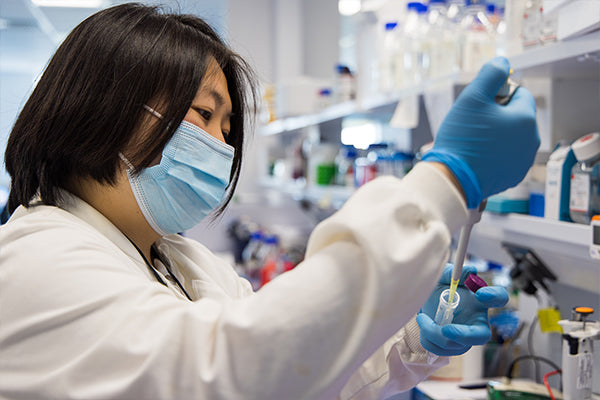Our Centres of Excellence

The Scottish Brain Tumour Research Centre of Excellence
The Scottish Brain Tumour Research Centre of Excellence is dedicated to advancing the development of new treatments for glioblastoma, with the aim of producing the evidence required to rapidly progress these treatments into clinical trials for patients in Scotland and beyond.
The Scottish Centre is based at the Universities of Edinburgh and Glasgow and is funded through a game-changing collaboration between Brain Tumour Research and Glasgow-based Beatson Cancer Charity.

Imperial College London
The Brain Tumour Research Centre of Excellence at Imperial College London is working to improve the diagnosis and treatment of adults with high-grade glioma, including glioblastoma (GBM), the most common primary high-grade brain tumour in adults.
The Centre has an outstanding 'Convergence Science' research programme that brings together researchers from a wide range of disciplines, leveraging their unique skills to answer scientific and clinical questions that will improve patient survival.

The Institute of Cancer Research
The Brain Tumour Research Centre of Excellence at The Institute of Cancer Research is studying paediatric-type diffuse high-grade gliomas (PDHGG), a collection of brain tumours in children in young adults which have extremely poor clinical outcomes.
The research team is identifying, testing and validating new therapeutic targets for PDHGG, including diffuse intrinsic pontine glioma (DIPG), as well as developing new drug delivery methods. The truly translational Centre is generating the laboratory data needed to support the launch of new clinical trials.

Queen Mary University of London
The Brain Tumour Research Centre of Excellence at Queen Mary University of London is focused on increasing our understanding of glioblastoma (GBM) tumours in adults, and finding new, kinder treatments for medulloblastoma and diffuse intrinsic pontine glioma (DIPG) in children.
The Centre is located at the Blizard Institute at Queen Mary and its world-class research is led by Professor Silvia Marino, Professor of Neuropathology. She is also a consultant in diagnostic neuropathology and the current Vice-President of the British Neuropathology Society.

The University of Plymouth
The Brain Tumour Research Centre of Excellence at the University of Plymouth is working to improve the diagnosis and treatment of children and adults with low-grade brain tumours, including schwannoma, meningioma and glioma.
The Centre is one of Europe’s leading research institutes for low-grade brain tumours and proactively works with national and international groups to swiftly translate their research into clinical benefit for patients.
Retired Centres

University of Portsmouth
Our first Brain Tumour Research Centre was established at the University of Portsmouth in 2010 under the leadership of Professor Geoff Pilkington, now a Professor Emeritus having retired in 2019.
The University of Portsmouth now stands alone as a sustainable brain tumour research centre in its own right, having been supported by Brain Tumour Research for its first nine years.

